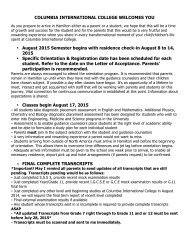french
You also want an ePaper? Increase the reach of your titles
YUMPU automatically turns print PDFs into web optimized ePapers that Google loves.
The indirect object pronouns do not agree with the past participle like the direct object pronouns do.<br />
When me, te, nous, and vous are used in a perfect tense, the writer must decide whether they are used<br />
as direct or indirect object pronouns. This is done by looking at the verb and seeing what type of<br />
action is being performed.<br />
The bread is given by the man (direct). Pierre gets the given apple (indirect).<br />
The Pronoun Y<br />
Indirect Object Pronoun - to it, to them<br />
The French pronoun y is used to replace an object of a prepositional phrase introduced by à.<br />
Je réponds aux questions. - J' y réponds.<br />
I respond to the questions. - I respond to them.<br />
Note that lui and leur, and not y, are used when the the object refers to a person or persons.<br />
Replacement of Places - there<br />
The French pronoun y replaces a prepositional phrase referring to a place that begins with any preoposition<br />
except de (for which en is used).<br />
Les hommes vont en France. - Les hommes y vont.<br />
The men go to France - The men go there.<br />
Note that en, and not y is used when the object is of the preposition de.<br />
Idioms<br />
En<br />
Ça y est! - It's Done!<br />
J'y suis! - I get it!<br />
Note how we say Je veux du pain to say 'I want some bread' ? But what happens when we want to say 'I<br />
want some' without specifying what we want? In these cases, we use the pronoun 'en'. As well, 'en' can mean<br />
'of it' when 'it' is not specified. For instance, instead of saying J'ai besoin de l'argent, if the idea of money<br />
has already been raised, we can just say 'J'en ai besoin'. This is because what en does is replace du, de la or<br />
des when there is nothing after it.<br />
Like with 'me', 'te' and other pronouns, en (meaning 'some') comes before the verb.<br />
Tu joues du piano? Non, je n'en joue pas<br />
Vous prenez du poisson? Oui, j'en prends.<br />
Vous avez commandé de l'eau? Oui, nous en avons<br />
commandé.<br />
Do you play piano? No, I don't play it.<br />
Are you having fish? Yes, I'm having some.<br />
Did you order some water? Yes, we ordered<br />
some.<br />
G: Commands with Pronouns - L'impératif<br />
When expressing positive commands, there are several rules one must remember when using object




